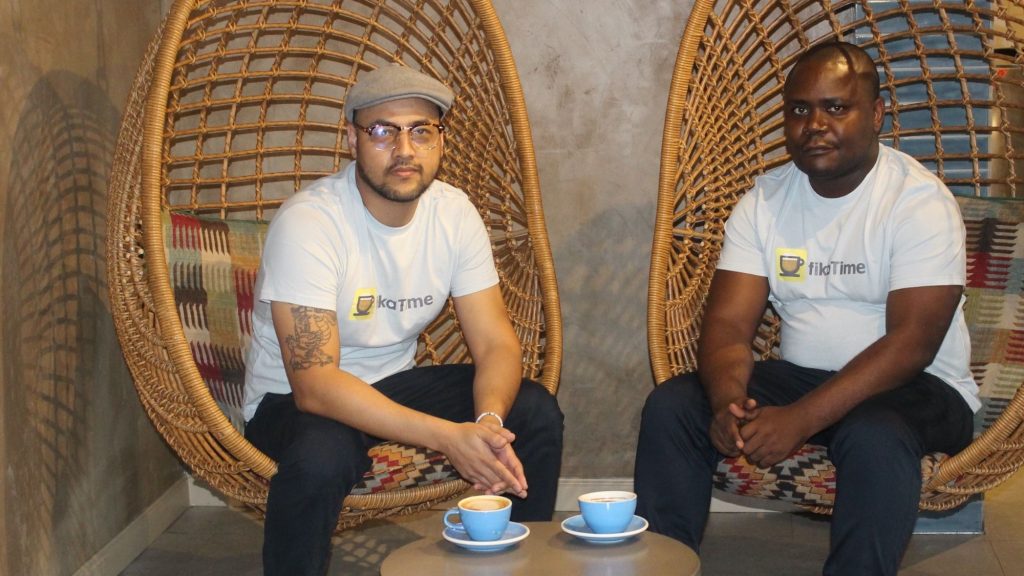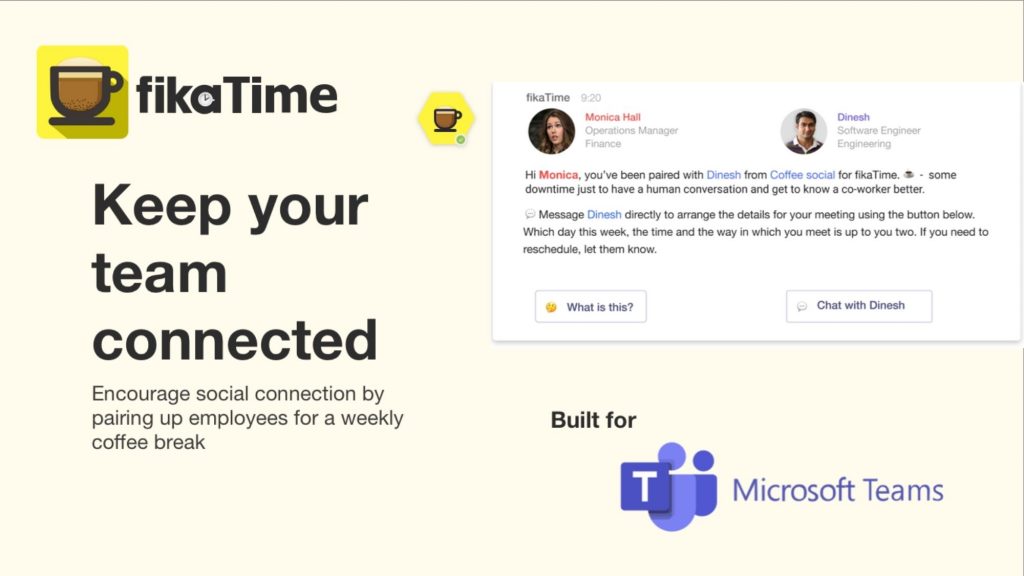AI chat is no longer just about faster answers or conversational tone. Search.com, a division of Public Good, has launched a generative AI search…
fikaTime founders find solace in Teams virtual coffee app

If you’re like the rest of us, you’ve probably had it with countless, endless, back-to-back and pointless meetings. You would much rather be having a coffee – except there’s no one around to talk to. Enter fikaTime, a new Microsoft Teams app that builds socially connected teams and pairs you up with a colleague for, well, a virtual coffee.
Its founders, Jarrod Gabriel and Acquim Matuli, have thus far managed to keep their start-up “lean and operated in stealth”. They’ve hit the sweet spot, though. fikaTime has already been used in six different continents and listed in Microsoft’s #BuildFor2030 as a partner whose technology solutions align with the UN Sustainable Development Goals.
“Building fikaTime while being a fully remote company certainly helped us see the value of staying in touch, but the value of building social connection is beyond just remote work,” says Gabriel, who is based in Johannesburg, South Africa.
“It is part of the human condition. One of our users told us, ‘I’ve found my best friend at work and I didn’t know she sat opposite me for so long,’ proving that small actions can lead to big impact.”
While both Gabriel and Matuli are African techpreneurs, they’ve named fikaTime after “fika”, a Swedish word for a coffee break that’s more about socialising than the actual coffee. The Swedes would know. They count among the world’s top champions for a healthy work-life balance.
fikaTime to the rescue
Speaking to Ventureburn, Gabriel confirms that fikaTime is a tech solution for a challenge faced by employees across the world – especially with remote working following the Covid-19 pandemic.
He says, “Whether you are a small organisation growing fast or a larger one with many departments, it’s all too common for employees to not take care of their mental health and feel disconnected from the organisation and each other. When this happens, it leads to loneliness and isolation, burnout and poor relationships between employees – regardless of whether you are remote or not.”
Gabriel, who has previously worked at start-ups and corporates, uses his expertise and interest in human behaviour to take products to market. He’s been around the tech block too, running Techstars Startup Digest in Johannesburg and even launching his own mobile app.
Matuli, who lives in Berlin, grew up in the Democratic Republic of Congo before coming to South Africa. Dreaming of AI as a kid, he is now an experienced software engineer with expertise in artificial intelligence. He has run DevOps for a number of large organisations and has been instrumental in many AI-driven projects in South Africa before accepting a job offer at a start-up in Germany.
“His hope is to help make a difference, through technology, to how society spends their time – more time meditating and contemplating than working hard,” explains Gabriel.
“When I approached Acquim about fikaTime, I knew we could work together on it because of our ability to complement each other’s capabilities. Having both experienced the issues that fikaTime addresses, we easily aligned on our ambitions for the product.”

He describes fikaTime as a Microsoft Teams bot that regularly pairs up different employees for a coffee break to help build social connection. It’s a simple value proposition but one that people can easily see the value of.
“There are too many tools that are too high on the tech, and not high enough on the people aspect, which is where products often fail with adoption,” adds Gabriel. “We are big believers in the 80-20 principle – 20% of most tools carry 80% of their impact. With fikaTime we make sure that the things we get right are the things that actually matter.”
Before launching fikaTime, Gabriel says he played around with many of the tools that were on offer for Zoom-fatigued employees. From Beer Friday to group chats and games night – all happening virtually, each had its pros and cons.
“I wanted to combine principles from behavioural economics with the benefits of a meditative ritual. The Swedish tradition of fika was such a relatable feeling that most people would understand. However, it needed to do more. It needed to help people expand their networks, break down silos and create a peer support structure.”
Having worked with Microsoft to make sure they got it right, fikaTime was launched on the Microsoft Teams store. The founders haven’t started fundraising yet, but are certainly looking into it. “For us it’s all about timing and the right type of partnership to realise our global ambitions in a relatively untapped market,” explains Gabriel.
For now, they’re encouraging as many people as they can to experience fikaTime. After all, as Gabriel stresses, collaboration doesn’t happen because you have a virtual whiteboard. It happens because you are able to connect with other people to solve a problem or to create.
“It’s dependent on relationships not pixels. The pandemic proved that human connection matters and building meaningful relationships requires dedicated time.”
ALSO READ: Huge funding boost for e-commerce platform Rentoza

